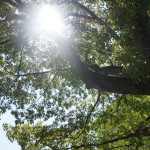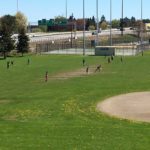Sustainability Committee has Portland’s Draft Pesticide Ordinance on Fast Track
by Bridget Chase
 The Sustainability and Transportation Committee began the process of reviewing the draft pesticide ordinance at their June meeting. The draft was submitted by the Pesticide and Fertilizer task force that was formed by Mayor Ethan Strimling in 2016.
The Sustainability and Transportation Committee began the process of reviewing the draft pesticide ordinance at their June meeting. The draft was submitted by the Pesticide and Fertilizer task force that was formed by Mayor Ethan Strimling in 2016.
The three-member Sustainability and Transportation Committee, consisting of Chair Spencer Thibodeau and Councilors Belinda Ray and Jill Duson, saw the June meeting as an opportunity to learn from City staff, the task force, and the residents who crowded the Council Chambers for the public hearing. Chair Thibodeau wants an “enforceable and strong pesticide ordinance.” He expects the review of Portland’s proposed pesticide ordinance to be informed, thorough, inclusive and completed in time for a full Council vote in September.
The Hearing
Julie Rosenbach and Fred Dillion represented the City of South Portland. They reviewed the evolution and ongoing roll-out of the South Portland pesticide ordinance.
Councilor Nicholas Mavadones, chair of the now disbanded Portland Pesticide and Fertilizer task force, told the committee that consensus was achieved between the organic and conventional interests on the task force. Mavadones reported that the task force drafted a hybrid ordinance that merged the two pest management approaches together.
Also, Ethan Hipple, Director of Portland’s Parks Division, reported on the concerted efforts of his department to reduce the use of pesticides in accordance with the City’s 2016 public landscape management plan.
South Portland and Portland Ordinances Compared
Both the South Portland and proposed Portland ordinances see robust attitude-changing education components (beyond what is already done) as essential to reducing the misuse and over use of pesticides. Both cities created oversight committees that are appointed by the City Councils and include professional turf applicators, environmental experts and residents. The ordinances require a three to five business day response to waivers, and both require annual reports on pesticide use.
The South Portland ordinance includes all lands and trees and expresses a commitment to organics. Further, the South Portland ordinance requires that any pesticides used must be on specific federal lists of approved substances. The ordinance language spells out circumstances that qualify for waivers. However, pro-organic groups see a weakness in the lack of enforcement mechanism in the South Portland ordinance.
In contrast, the Portland draft ordinance bans both organic and synthetic pesticides without a written waiver. Also, it contains an enforcement provision. In fact, the ordinance carries fines that range from $50 to $500. But, not all lands are included in the ordinance, and this is a concern for opponents. Namely, the ordinance targets turf and hardscapes that most often use pesticides for cosmetic purposes, such as lawns, athletic fields, parks, patios, driveways and walkways. In the draft ordinance, an oversight committee drafts the specific waiver language. Specifically exempt from the ordinance are Hadlock Field, Riverside Golf Course, right-of-ways and trees.
Public and Industry Testimony
Many of the people that spoke were supportive of a South Portland-type ordinance that they argue is stronger. Many residents testified that they want to feel safe from unnecessary exposure to pesticides, especially those known to be carcinogenic, or hazardous to bees and other pollinators and marine life. Several speakers were organic gardeners and farmers.
Opponents to the ordinance were concerned about furtive use of pesticides by homeowners. Also, some were concerned that the draft ordinance creates a more difficult environment for professional lawn care services and applicators.
Portland’s Commitment to Reduce Pesticides Has Already Begun
Portland City Council has discussed the need to reduce pesticide use on public and private spaces since 2006. The conversation was begun by former West End Councilor David Marshall and continued by former Councilor Jon Hinck until 2016. Formal action on public land began in early 2016, when Portland’s City Manager approved a formal landscape management plan to reduce the use of pesticides.
According to Ethan Hipple, Director of the City’s Parks division, Portland’s vast public lands do not use pesticides with the exception of about eleven acres. Also, he believed that the Parks Department is 98-percent compliant with the current task force’s draft pesticide ordinance. He voiced concerns about adhering to an organic approach on high use fields and the timeliness of the waiver process.
Portland’s Riverside Golf Course Supervisor Gene Pierotti noted that the course is not included in the current draft ordinance, and he is not concerned if this might change. He wants the golf course to be a model of good stewardship to the environment. The golf course has already reduced synthetic pesticide use by 60-percent and with good results. The 27-hole golf course treats one third of the course with pesticides every third year, while introducing organic methods that include raising bees.
RESOURCES
The draft ordinance can be found in the Pesticide and Fertilizer Task Force Report: http://thewestendnews.com/pesticide-ordinance-fast-track
Bridget Chase
Bridget is a West End resident.






